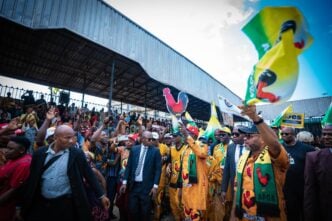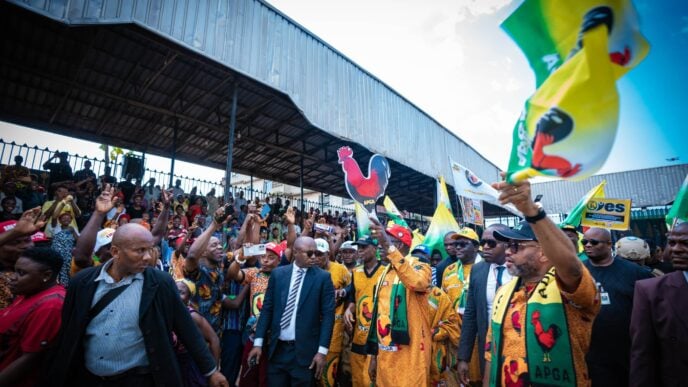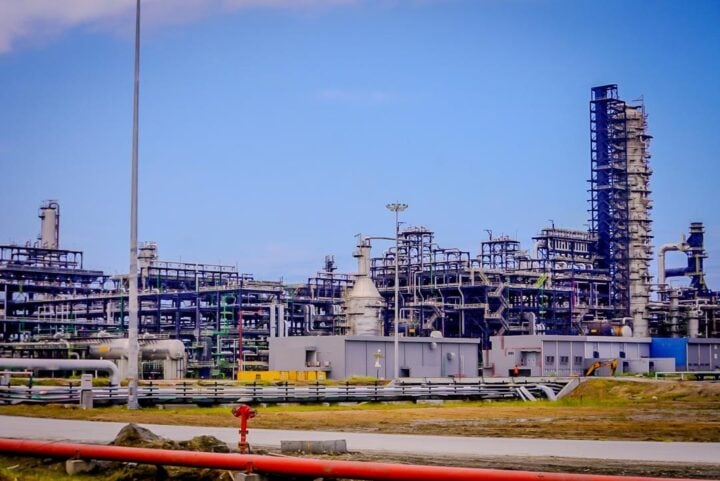The world as we know it is now in a state of complex flux. And our current conceptual framework for understanding the breakneck speed at which things are moving is to say we now live in a VUCA—vulnerable, uncertain, complex and ambiguous—environment. This understanding has some significant implications for the way we see our lives, our relationships, our organisational dynamics – the way work is organised, the way we get work done and the way we produce. And so, when the Chartered Institute of Personnel Management of Nigeria (CIPM-N) recently convened its 57th Annual International Conference in Abuja, there was no other theme that could be more auspicious and imperative than reimagining the intersection of management, work, workplace dynamics and disruptive technologies. And this is all the more as we reflect on the trajectories of all these within a difficult administrative context like Nigeria.
We are at the dawn of a new knowledge age that is driven by information and technologies that are creating new mindsets, conceptual tools, management systems, culture and all, in ways that enable public administrators, personnel and human resource managers to rethink the traditional understanding of what an organisational workplace means in the new normal. With the fast rate at which new technologies are emerging, there is an increasing geometric rate at which traditional management and bureaucratic borders are being seamlessly dissolved and disrupted. Knowledge, information and data are mediated by artificial intelligence and the Internet of Things with an enormous computing power to not only generate new forms of interactions between humans and machines, but they also complicate and transform the task of managers in the workplace regarding human resource functions and management, decision making and policy architecture.
There is another dimension to this complex flux that is often missed in our conceptual and managerial reflection about change and transformation. The transformation of the nature of work and of workplace conditions and dynamics is not solely a technical, technocratic and technological matter. The transformation of the workplace by knowledge, information and data inflow, as well as disruptive technologies, has significant sociological implications that impact value orientation, identity construction, tradition and experience, communal ethos, social inequality, and essentially what it means to be human in the world of work. These are all issues that must form the basis of policy action and management research by public administrators, public managers, management and administration scholars and researchers, and the entire communities of service and practice.
While the private sectors across the world, and most public sectors, were already fast-tracking their alignment with the emerging times, especially in managerial revolution, it took the COVID-19 pandemic to deepen our understanding of the parlous state of the Nigerian institutional and administrative resilience in the face of disruptive challenges like an unyielding virus. The pandemic demonstrated starkly the structural weaknesses in the capability readiness of the public sector, the fragmentation of work in the public sector workplaces, and the near-absence of policy innovation and creativity.
Advertisement
Fundamentally, it raises an urgent concern about public sector institutional resilience-building, and the capacity to manage emergencies, early warning signals and systems, crisis response and crisis mitigation.
What I consider to be the most urgent workplace consideration in the face of the daunting flux of transformations of the nature of work is what we can call the people issue. This is the issue of how persons and personnel remain the focus of whatever reforms, changes and adjustments that information, data, knowledge and technologies are forcing on the reconstitution and reimagining of the nature of work and of the workplace. The other dimension of this people-issue is how the public service workplace is regenerated—instigated by the pandemic—to mainstream into its operations, technologies and new managerial procedures and processes that shift the paradigms in terms of redefining citizens’ engagement by placing the citizens-as-customers at the centre of service delivery designs. This is a development that many advanced economies have already integrated into their public sector optimal functions.
The open government initiative, a crucial part of the new managerial revolution in the public service, refocuses the significance of the people as citizens, and insists on giving attention to the challenges of where, when and how people work and how they are worked for especially within the context of how digitally-enabled platforms and technologies assist the government and the public service to measure institutional and administrative successes and performances in humane and transparent ways. Public managers and administrators are then compelled to focus not only on the imperatives of work-life balance that often dehumanise humans as mere capital or resources in the workplace. But also articulate, within an administrative context like Nigeria, best practices that involve participatory budgeting, co-creation of public values, delegated authority within an evolving decentralised work environment, as well as real-time strategic communication dynamics within bottom-up planning frameworks that instigate co-designing of policies and decision-making.
Advertisement
Within the contemporary workplace, public managers are fast taking on many roles that accentuate their transformational—rather than merely transactional—significance in the workplace. Traditionally, they were regarded as (a) expert—advising the government on policy decisions, (b) regulator—oversight over outsourced and externalized functions of government, (c) engager—shaping the larger issue of the public good and how it affects the community, and (d) reticulist—identifying new skills and expertise and bringing them together to achieve good results and outcomes. However, within the new knowledge and technologies environment, an average public manager must also be a critical, discretionary and proactive juggler, with the capacity to balance the human-machine components of the workplace.
In Nigeria, there are two variables that are critical in the attempt to functionally configure the workplace, especially in Nigeria. The first is the damaging effect of the brain drain, or the japa syndrome. This is a situation where Nigeria’s national and work environment has led to the unceasing search for better living and working conditions abroad. The second variable, which further reinforces the first, is the increasing incidence of machine or artificial intelligence, displacing humans as workers in the workplace in terms of functions such as bookkeeping, payroll processing, accounting, etc. This is further complicated by the growing informalization of wage employment—including the implications of the GIG economy—that complicate the social protection systems and labour regulations guiding employer-employee relations, especially in terms of formal and written employment contracts, as well as the dynamics of the labor laws and contracts system that inform the processes of access to formal benefits like gratuity and pension, health insurance scheme, etc.
All the above have fundamental implications for how we reimagine and reform first, public administration systems and public sector institutional dynamics, but also the understanding of work and skills management in the workplace. The most critical challenge goes to the policy makers, public administration academics and researchers and human resource experts to reflect on how the complex interplay of knowledge, data, information and technologies is reconfiguring the nature and meaning of work in the twenty-first century and the implications of all this for human capital development, productivity and national development in Nigeria. Institutional reform of the workplace begins with the urgency of rethinking the intellectual bases of what work, jobs, skills, pay and compensation, as well as sundry employment policies, as ways and means for making the workplace functional.
Adapting to the changing nature of work and of the workplace requires a value reorientation in the form of a new mental model and a cultural readjustment program that helps the workforce to adapt to a new technology-enabled environment where artificial intelligence and new technologies in the workplace create opportunities for the development of new skills set in domains like software design, data analysis, while also allowing for the deployment of big data, blockchain, digital technologies and platform, etc. to perform round-the-clock services and streamline internal processes that contribute to improving evidence-based policy-making.
Advertisement
A constant programme of re-professionalisation, training and upskilling will become important not only for the workers but even more so for the public managers to stay on top of new demands for workplace culture, ethical relations, work-life balance, and flexible human resource functions. The new workplace operating under the new normal will task the administrative and managerial acumen of the public manager, whose transformational capabilities and competences will be tasked to manage the human-machine industrial relations.
Indeed, one of the most fundamental tests of the managerial acumen that will be needed, especially in a hesitant administrative environment like the Nigerian public sector, is its capacity to attract, retain and incentivise workers who have many available options of working in a more friendly, technologically-savvy and ethically relational workplace that respects their unique talents. One of the most unique characteristics of the nature of work and of the workplace that allows for flexible adaptability—the capacity of workers to seamlessly move from one job to the other, or to keep multiple jobs simultaneously.
The Nigerian government is tasked, even more significantly, to become proactive in the development of educational and administrative curricula in public administration and public management while also activating the many administrative training institutes across the country to key into basic and action research that emphasise skills development that cannot be easily replaced by machines and robotics in areas like critical thinking, emotional intelligence, conceptual and analytical competences, and ability to manage project complexities, and problem-solving. The fundamental key to transforming the workplace is, therefore, the willingness to continuously educate the workforce and build their capacity for “learning to learn” the dynamics that keep changing the workplace. This will require equipping future employees through creating new knowledge based on intelligent prospecting of future work and the future skills requirements the national economy will need to keep performing productivity.
Olaopa, a professor of public administration, is the chairman of the Federal Civil Service Commission, Abuja.
Advertisement
Views expressed by contributors are strictly personal and not of TheCable.










